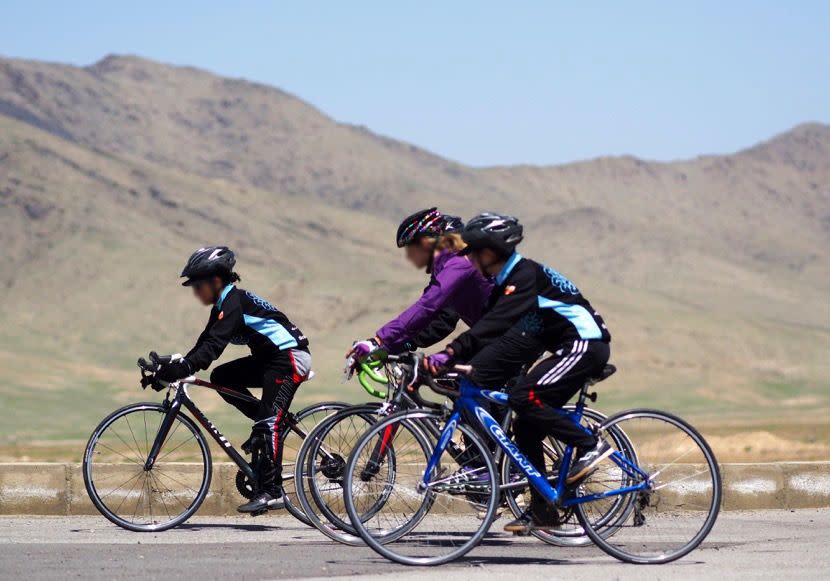As the Taliban Retakes Afghanistan, Women Cyclists Fear for Their Lives

The women cyclists of Afghanistan are fearing for their lives.
Following the withdrawal of U.S. troops from Afghanistan after a 20-year-long campaign, the Taliban have again taken control of the country and most recently the capital of Kabul on August 15. That includes the main airport, and consequently one of the main modes of evacuation for the countless Afghans now looking to escape the country and the Taliban’s persecution.
Shannon Galpin is an American activist who has worked extensively in promoting women’s rights in Afghanistan since 2008 and supporting the women’s national cycling team there since 2013. Galpin has stayed in contact with a “large number” of the women she’s worked with, and she says that all of the cyclists and other athletes that she’s communicated with during this crisis are looking to evacuate as soon as possible, many with family in tow.
“They know they are targeted. Some are in hiding and under imminent threat. They’re all requesting immediate evacuation,” Galpin said.

Galpin’s had direct confirmation from multiple people in Kabul that the Taliban are going door to door looking for people. And she shared a message from one of the women cyclists in an Instagram post:
“Yes, the airport has become very dangerous, only the sound of shooting. People do not move at the airport. And the Taliban check every 10 meters. I do not know how to get to the plane. I hid in my friend’s house. And I burned all my bicycle accessories and bicycle clothes.”
The women are burning more than just their bike gear, too. They’re burning diplomas—the universities themselves even burning records—any evidence that would go against the Taliban’s misogynistic beliefs. When they do, hopefully, set about rebuilding their lives, they’ll have no physical proof of their past accomplishments.
“What I see are Afghan women literally burning their futures,” Galpin told Bicycling. “And they’re willing to burn it, because that will keep them alive.”
Galpin says that all women athletes in Afghanistan—cyclists, climbers, skiers, basketball players, and more—are now targets of retaliation from the Taliban, whether it’s in the form of death or some other horror. In truth, that’s the case for many Afghan women, but especially those who have defied the Taliban’s strict gender norms by participating in sports, going to school, or getting a job. When the international community looks the other way, anything could happen, Galpin says.
But the women cyclists in particular have been especially high-profile. And the cycling community and bike industry have played a role in that publicization.
Join Bicycling All Access for more cycling news
“We cannot then just abandon them when we celebrated them, and feted them, and encouraged them to dream big—which they did at great risk,” she said, and that we need to “stand in solidarity through actions, not just through words.”

The immediate goal for these women cyclists and their families is evacuation. Then they’ll need a home, and then they’ll need a bike—“because that’s their identity,” Galpin said. From what she has witnessed, Afghan refugees with bikes, like those from the women’s national team, are better integrated into their new communities because of the sport as compared to other refugees.
In order to do that, it’ll take extended dedication from the cycling community (and international community at large). Here’s how you can help.
How You Can Help Afghan Refugees
Donate
Galpin has set up a fund to raise money to help evacuate and resettle the cyclists.
Another activist, “Quentin Quarantino,” has set up a GoFundMe to raise money to charter humanitarian evacuation flights out of Afghanistan for high-risk refugees. The average cost of these evacuation flights is $1,500 per person in U.S. dollars.
Call your state representatives and senators
Find out if your government is deporting Afghans back to Afghanistan. Tell them that your country needs to accept Afghan refugees.
“Understand that this is apolitical at this point. Pointing fingers at who did what isn’t going to help refugees. Our goal needs to be, as a country, to show compassion and live up to humanitarian values,” Galpin said.
Volunteer your time and skill sets
There are a variety of ways you can volunteer your time to help Afghans during this crisis, such as through sponsoring Afghan families and helping them get resettled in your community. Immigration and human rights lawyers are especially needed right now; if that’s you, volunteer to work pro bono. Mental health professionals are also greatly needed to help these refugees cope with the trauma they’ve experienced—and will likely continue to experience.
Amplify Afghan voices
Share stories about and from Afghans across social media.
Learn more about how to advocate for and help Afghan women here.
You Might Also Like

